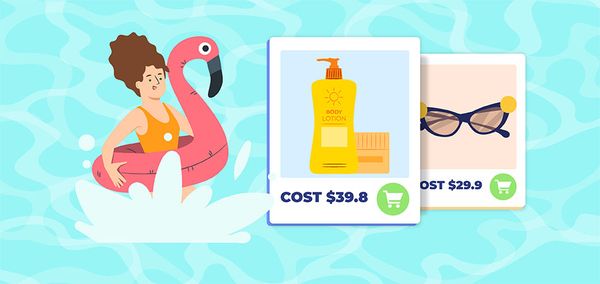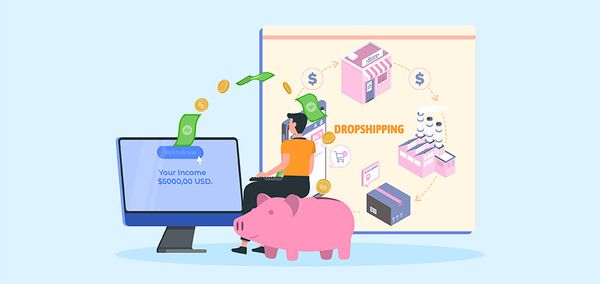White Labeling vs Private Labeling: Dropshipping Businesses Should Know

Any business that is purchasing or sourcing products to sell to customers should understand the difference between white labeling vs private labeling. Every product in the market is white or private-labeled by the manufacturer. Based on this, retailers take this product and sell it to end customers.
As a dropshipping business, you use products from different marketplaces to sell on your website. To understand which products you can and cannot sell, you must first understand the difference between white labeling and private labeling.
Hence, in this article, we will review the difference between white labeling vs private labeling.
Understanding White Labeling
White labeling is the generic term we use for products that can be sold by many retailers. Once the manufacturer has produced any product, they send it out into the market to distributors. From this part of the chain till the end customer, any retailer or small seller can rebrand the product to sell it under their brand name.
If you look at it, this format gives power to many businesses because they don’t need to create the product. They only need to focus on branding, marketing, and packaging. You will find many large businesses using this model to rebrand products and sell them under their brand name. However, this is not to say that the model won’t be effective for small businesses. Ideally, the structure is best for small and dropshipping businesses because they don’t need to spend money on manufacturing.

An interesting fact about the term "white labeling" is that it was first used in the music industry. The term was assigned to releases that were public and anyone had a right to use it. However, later on, the term was widely used in other industries for similar concepts.
Understanding Private Labeling
The meaning of private labeling is obvious now. Private labeling is used when the products are specific to a certain company and can’t be sold or used by another retailer or seller. When manufacturers create and design products based on the unique requirements of the seller, they privately label them. Then, only this seller can rebrand and sell the product.

In private labeling, there’s a huge scope for earning better profits, and it is much more affordable. Therefore, the market for privately labeled products is also huge.
Many retailers get products manufactured and offer them a brand name to sell them. In this case, manufacturers can easily create two similar products and sell them to different brands for private labeling.
Differences Between White Labeling & Private Labeling
What is the key difference between white labeling vs private labeling?
How do we know which one is right for our business?
Here are some important differences between white labeling vs private labeling. Read carefully to understand what types of products dropshipping businesses can use.
Exclusive Product
The most important difference between white labeling vs private labeling is the exclusivity of the product. For example, if one retailer uses private labeling, the product may be somewhat unique.They have fewer competitors, and they are better able to highlight the features of the product.
| Get Started Now to Grow Your Online Business with the Best AliExpress Dropshipping Tool - DSers! |
However, white labeling only means that the manufacturer is making the product and many retailers are selling it. In this case, it is definitely easier for the retailer or dropshipping business to pick valuable products and attract a pre-built audience. However, white labeling doesn’t allow retailers to differentiate their uniqueness based on design and features. They can only use marketing and branding to make a difference.
Customization
Another key difference between white labeling vs private labeling is customization. Any company selling private labeling products is able to customize the product to some extent. They can share specifications and design requirements with the manufacturer even before production starts. This helps them customize the product according to the audience.
White labeling doesn’t allow retailers or dropshipping businesses to customize the product. They can use generic products on the market, re-brand them, and sell them. However, dropshipping businesses selling white labeled products do have the freedom to change and modify the packaging of the product, which is somehow related to the marketing of the product.
Usage
You will commonly find privately labeled physical products, such as household items, cosmetics, clothing, etc. This is because businesses trying to create a brand name in this field prefer to manufacture the product. So, they privately label products and sell them under their brand name. Furthermore, this also offers an opportunity to customize and make the product better according to customer needs.
However, this is not to say that these physical products are not white labeled. Although cosmetics are rarely white-labeled, you can still find white labeled outfits, household items, etc.
With that being said, white labeling is commonly used for technology products too, where the manufacturer creates the product and allows businesses to sell it under their brand name.
Investment
There’s no doubt in the fact that private labeling costs more money. You are getting products customized as per your requirements, which requires money. So, you need a good budget to research, source, and produce privately labeled products. But, the ROI generally reflects this investment.
On the other hand, white-label products are less costly. The cost of production is lower because the manufacturer is completing a huge assignment in one go. So, you can also acquire their product category at affordable rates. This is expected to give you a higher ROI given that you know how to achieve the following:
- Research for popular products
- Market products well
- Use the right tools for better outreach
- Understand the importance of packaging
- Check the quality of products
Which One Should You Use
As a dropshipping business, you may be wondering which one you should use.
From the above discussion, we can say that dropshipping businesses can use white labeling for their products. Here’s the reason why:
If you are using privately labeled products, you are customizing manufacturing and getting one type of product exclusively for your company. Firstly, the cost of sourcing is too high, and secondly, you need to create an inventory for the same. No manufacturer would keep the assignment in their warehouse only to ship it on an as-needed basis. You need to pay for a larger order.
For these reasons, dropshipping businesses do not benefit from using private-label products.
However, it is possible that we tie-up with a brand that is selling privately labeled products to continue our dropshipping model.
Contrary to this, white-labeled products are more convenient for your business. You can easily take these generic products, brand them with your business name, and sell it. You may find many businesses selling white-labeled products on AliExpress, which can become your sourcing point.
Conclusion
It is necessary to know the difference between white labeling and private labeling to carefully select and sell products on your website. Sometimes privately labeled products can’t be used in a dropshipping model. Therefore, you need to check with the brand or seller for clarification.
However, in general, white labeling seems like a popular choice with less money investment and high marketing requirements. These needs align with the requirements of your dropshipping business, which improves your ease.
Research your products and check labeling before putting any product on your website.













 Company
Company
 Why Choose DSers
Why Choose DSers
 Blog
Blog
 Help Center
Help Center




 Live Chat
Live Chat